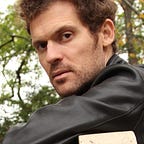Piano, piano… forte, forte!
Categorized in: Arts reviews
Over the keyboard of a concert grand in an overlit recording studio, barely noticing the Bremen Philharmonic Orchestra behind him, which he directs sporadically, sits a hunchback with large hands, using them to play Bach and to dramatically brush back thick strands of James-Dean-worthy hair. The next second reveals that it is a man with a palsy, his face contorted into a grimace corresponding to a pain of 11 on a scale of 1 to 10, and the next shows the face of a man of, say, 27, in a simple black v-neck sweater, still playing Bach, and playing him with a facility and assuredness that are uncanny, otherworldly. Frightening.
He has large brown eyes, sensuous red lips, the aforementioned good hair, a balanced face. He is lanky, not too tall, not too short, and has the pouncing gait and reflexive body language of a young rocker. He is an amalgam of the young Mick Jagger, David Bowie, and, appropriately, since he is playing Bach — Glenn Gould.
On his face passing intimations of epiphany, tragedy, clairvoyance, the pain of intolerable pleasure, the ravishment of seeing G-d’s own face, an imbecile’s Napoleonic grandstanding, the disarming directness of a child, and dozens others and half-others register before crumbling into the next grimace. To say that he is too much would be to say nothing at all. It would make much more sense to ask who gave this character the weekend pass from the insane asylum.
His eyes pop, his neck veins bulge, his fingernails are bitten and frayed. One moment his head is back in receipt of divine grace, the next, mouth open over the keyboard, he is gasping for air, biting at unseen magic dragonflies.
He’s brisk to the point of brusqueness. He hectors the orchestra, however Frenchly. “Obsession!” he growls, looking into the players’ eyes for a response (a waste of time, as they are German, tenured, and simply not used to this kind of crazed passion). “You have to be like a psychopath on this, no?”
To add to all of this, he periodically comments into a microphone to Etienne, his audio engineer, in French, of course, on the sound of the orchestra and on his general impression of the whole thing (seldom favorable). Not surprisingly, the camera registers many an arched eyebrow and eye roll from the players.
And then the director treats us to splices of him at the piano in some stylized basement, a light scarf waiting to slip off his shoulder, explaining his understanding of the same passages in an impenetrable grounds-of-Versailles-stroll-avec-parasol-et-petit-poodle French, condescendingly transmogrified into tiny English subtitles for the benefit of non-Francophone viewers.
He is maudlin, mawkish, hyperbolic, histrionic. He prefers abstractions, philosophy and top-heavy metaphors for the simplest descriptions; in short, he’s French. He makes faces that would get a third-rate actor booted from last-minute auditions to be an early-morning weekend children’s party clown for a provincial town’s Orphans & Widows Society. He is off-putting, grotesque, quite possibly disingenuous. He is the very picture of an overbearing, pompous, self-absorbed, overintellectualizing snob. Did we mention that he speaks English with a clownish French accent? We did mention, didn’t we, that he’s French?
And yet…
His criticism is on-target, his suggestions relevant, ideas original. “Bach’s point is not virtuosity. His point is to bring matter more intensely to the boiling point!” His insights are not trite, his generalizations highly inspired. As he finally teases the sound he’s always had in his head from the players, we start seeing smiles of genuine wonder on their faces. His musical instinct is impeccable. He is one exasperatingly annoying bastard, but he’s pretty close to genius.
“How can you play Bach after Glenn Gould?” ask the liner notes for this 2008 film by Bruno Monsaingeon. This is how.
Drop everything and listen for yourself.
